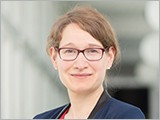| Tuesday, May 6 | Program |
|---|---|
| 12.00 | Opening and Welcome |
| Session 1 | Vacuum Technologies for Advanced Manufacturing: Insights into Roll-to-Roll Systems Chair: Dr. Cindy Steiner |
|
| The introduction covers vacuum technologies that are crucial for advanced manufacturing, especially in roll-to-roll systems. By combining theoretical knowledge with practical skills, participants will gain an understanding of the physics behind sputtering and evaporation, as well as their relevance in modern industry. Furthermore, the introduction delves into roll-to-roll winding systems, providing insights into the roll-to-roll manufacturing process and highlighting the importance of efficient winding systems while addressing challenges and solutions for the high-quality transport of web through a roll-to-roll machine. | |
| 12.10 | Introduction into Physical Vapor Deposition Dr. Matthias Fahland (Fraunhofer FEP) |
| 12.35 | Advanced Roll-to-Roll PVD Technology: Transforming High-Volume Production of Precision Multilayer Devices Mike Simmons, President & CEO (INTELLIVATION LLC) |
| 13.00 | Coffee Break |
| Session 2 | Sustainable Packaging: Innovations in Roll-to-Roll Coating Technologies Chair: Jan Hesse |
|
| In the quest for sustainable packaging solutions, roll-to-roll coating technologies are essential to provide flexible packaging materials in cost-efficient industrial scale. This session will delve into the latest advancements in various roll-to-roll coating techniques that enhance the sustainability of packaging materials. We will explore how these technologies contribute to reducing environmental impact by minimizing material usage, enhancing recyclability, and improving barrier properties. Special emphasis will be placed on the handling and functionalizing of biobased and biodegradable materials using roll-to-roll processes. Join us to discover how roll-to-roll coating technologies are paving the way for a greener future in packaging. | |
| 13.35 | Laser texturing for continuous, R2R production of functional surfaces Girolamo Mincuzzi (ALPhANOV) |
| 13.55 | Circular flexible packaging designs with post-consumer recyclates and barrier coatings Dr. Esra Kücükpinar-Niarchos (Fraunhofer IVV) |
| 14.15 | AlOx & SiOx Barrier Coatings for Sustainable Flexible Packaging Dr. Markus Piwko (VON ARDENNE GmbH) |
| 14.35 | Less is More: Deposition and Use of Inorganic Oxide Coatings in Sustainable Packaging Peter Olbrich (Applied Materials WEB Coating GmbH) |
| 14.55 | Coffee Break |
| Session 3 | Advances in Surface Structuring: Nano-Imprinting, Curing against drum, and Embossing Processes Chair: Dr. Steffen Günther |
|
| This session delves into the latest advancements in surface structuring technologies, focusing on nano-imprint lithography, curing against drums, and embossing processes. Attendees will gain insights into the methodologies and applications of these techniques in creating structured surfaces. Through expert presentations and discussions, we will explore the challenges, innovations, and future directions in the field. This session is essential for professionals seeking to enhance their understanding and application of surface structuring in various industries. | |
| 15.30 | Seamless stitching by step&repeat UV imprint lithography for R2R and R2P tooling Barbara Stadlober (Joanneum Research Forschungsgesellschaft mbH) |
| 15.55 | High-volume replication of optical components with nanoimprintlithography (NIL) Katrin Christiani (Temicon) |
| 16.20 | Closer to nature: Industrial surface texturing using curing against drum and electron beam technology Dr. Markus Schütz (Surteco Group SE) |
| 16.45 | Advanced patterning for Nano-Imprint masters Brid Connolly (Tekscend) |
| 17.10 | Closing |
| 17.20 | Bio Break |
| 17.30 | Lab Tour |
| 18.20 | Dinner and Poster Session at Technical Center Fraunhofer FEP |
Contact Press / Media
Dr. Cindy Steiner
Group Manager: R2R Sputtering and PECVD
Fraunhofer FEP
Winterbergstraße 28
01277 Dresden
Phone +49 351 2586-143
 Fraunhofer Institute for Electron Beam
Fraunhofer Institute for Electron Beam

